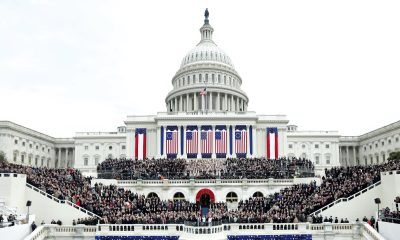Investing
World stocks cling to upbeat mood, dollar stalls

© Reuters. FILE PHOTO: A passerby walks past an electric monitor displaying various countries’ stock price index outside a bank in Tokyo, Japan, March 22, 2023. REUTERS/Issei Kato
By Dhara Ranasinghe
LONDON (Reuters) -World stocks rallied on Tuesday as traders held onto hope that interest rates will soon peak and fall later this year, even if the latest U.S. jobs data supported the case for a May hike by the Federal Reserve.
Trading was largely sluggish as many markets reopened after a long holiday weekend.
European stocks added 0.5% , U.S. equity futures pointed to a positive Wall Street open and Japan’s blue-chip rallied over 1%.
Bolstering the case for global inflation easing further this year, data showed China’s consumer inflation hit an 18-month low and factory-gate price declines sped up in March as demand remained weak.
Investor morale in the euro zone meanwhile improved in April after a surprise dip in March, a survey showed.
South Korea’s central bank held rates steady for a second consecutive meeting on Tuesday, while the Bank of Canada is expected to leave rates unchanged when it meets on Wednesday.
Friday’s non-farm payrolls suggested labour markets remain resilient, boosting expectations for a 25-basis-point (bps) U.S. rate increase in May. Markets price in a roughly 70% chance of a May hike, having last week priced such a move as a coin toss.
“It seems that we are currently in an environment that the world is looking at a soft landing and the need not to over-tighten policy,” said Nordea chief analyst Jan von Gerich.
“The payrolls number was strong enough to suggest that the economy could avoid a deeper recession but not too strong to suggest the Fed needs to tighten by much more.”
Traders still price in rate cuts by year-end as the economic growth outlook weakens, exacerbated by banking turmoil.
An analysis in the International Monetary Fund’s latest World Economic Outlook suggested that current high rates “are likely to be temporary” and predicted that, once inflation is brought under control, rates in advanced economies would eventually return to pre-pandemic levels.
The International Monetary Fund’s latest global economic outlook is out later on Tuesday.
U.S. March inflation data on Wednesday could provide the next steer for markets on the rate outlook.
“I don’t think the Fed should be hiking rates again but the reality is that they probably will do one more 25bp hike,” said Guy Miller, chief market strategist at Zurich Insurance Group (OTC:).
“The reason for that is that core inflation is still running at high levels and the services sector is very robust.”
STABILITY
Investor sentiment has also been boosted by signs that turmoil in the banking sector is easing.
Deposits at U.S. commercial banks rose near the end of March for the first time in about a month, showing signs of stabilizing after the two largest bank failures since the financial crisis rocked the banking system and rattled depositors, Federal Reserve data on Friday showed.
In Europe, UBS shares rose just over 1% after JP Morgan raised its target price, while the Swiss parliament held an extraordinary session to discuss last month’s UBS-Credit Suisse deal.
“My feeling is that it’s not over – we’re just beginning to feel the pain of these much higher interest rates. And banks may be okay for now, but the credit risk is still to impact both them and the economy,” said Zurich’s Miller, referring to recent pain in markets.
The dollar was broadly softer, giving up some of its post-payrolls gains. It eased 0.4% to 133 yen, after jumping 1.1% on Monday. The euro was up 0.5% at $1.091.
touched a fresh 10-month high at $30,438 before pulling back to $30,148, after breaking free of recent ranges on Monday. The digital token had been stuck between about $26,500 and $29,400 for the previous three weeks.
In Asia, Japanese government bond yields mostly fell, after new Bank of Japan Governor Kazuo Ueda vowed on Monday to maintain the bank’s ultra-loose monetary policy.
The 10-year JGB yield fell to as low as 0.445%, its lowest since April 4, after hovering at 0.465% in the previous session.
Most 10-year European government bond yields rose as markets played catch-up with the rise in U.S. yields following Friday’s jobs data.
U.S. Treasury yields edged down on Tuesday, however, with rate sensitive two-year yields 4 bps lower at 3.96%.
Elsewhere, oil prices gave up early gains with futures last down 0.17% at $84.02 a barrel. U.S. WTI futures dipped 0.1% to $79.63.
Read the full article here

-

 Investing7 days ago
Investing7 days agoMoldova breakaway region to face new power cuts on Saturday, officials say By Reuters
-

 Investing7 days ago
Investing7 days agoReebok Co-Founder Backs Syntilay’s New AI, 3D-Printed Shoe
-

 Side Hustles7 days ago
Side Hustles7 days agoHow to Survive High-Demand Seasons Without Losing Customers
-

 Side Hustles5 days ago
Side Hustles5 days ago5 Things That Could Significantly Impact Your Company in 2025
-

 Investing5 days ago
Investing5 days agoNFI Group surge after board reshaped with new appointments, chairperson By Investing.com
-

 Side Hustles6 days ago
Side Hustles6 days agoHow Failing 22 Times Paved the Way to My Success
-

 Side Hustles7 days ago
Side Hustles7 days agoShake It Up — Dunkin’ Debuts Star-Backed Winter Menu
-

 Make Money7 days ago
Make Money7 days ago9 Easy Steps to Begin Your Gold Investment Journey


















